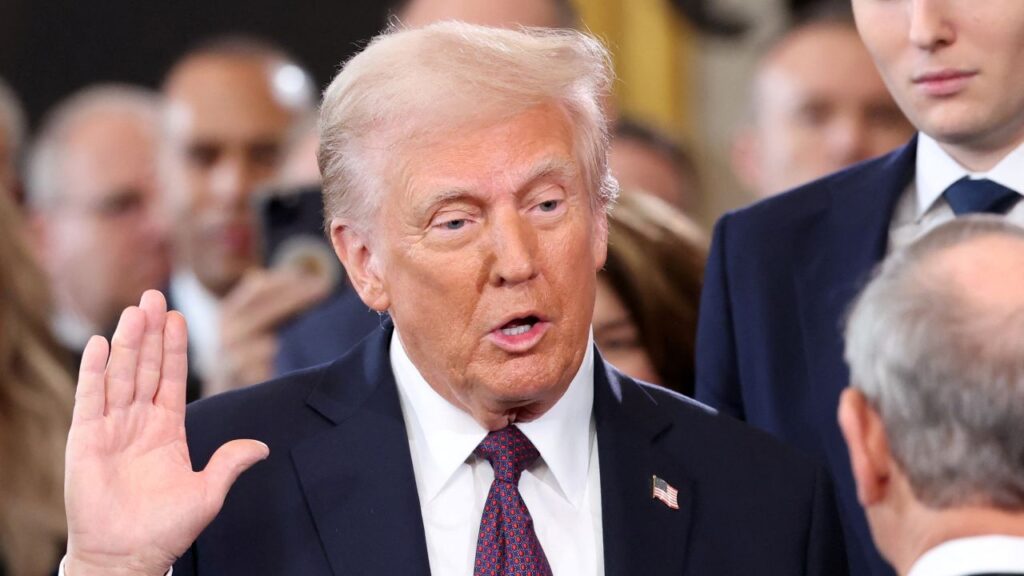Washington, D.C. – U.S. President Donald Trump has opened a three-day summit in the American capital with five African heads of state, notably excluding Africa’s largest economy, Nigeria. The summit, which began on Wednesday, is being described by the White House as an “incredible commercial opportunity” as Washington intensifies its “trade, not aid” engagement strategy with the continent.
The African leaders hosted include:President Mohamed Ould Ghazouani of Mauritania, President Boakai Among of Liberia, President Umaro Sissoco Embaló of Guinea-Bissau, President Ali Bongo Ondimba of Gabon and President Bassirou Diomaye Faye of Senegal
These leaders, while not representing Africa’s largest or most industrialized economies, are seen as key partners in regional stability and trade relations.
Focus on Trade, Tariffs, and Diplomacy
The summit, reportedly organized through the U.S. State Department in coordination with the respective embassies, aims to deepen commercial diplomacy, explore regional security partnerships, and unlock opportunities in strategic resource sectors such as mining, energy, and agriculture.
A major point of discussion is expected to be the 10% tariffs currently imposed by the U.S. on goods from these nations. With many of the invited countries seeking improved trade terms, the leaders are reportedly hoping to negotiate reduced tariff rates during the summit.
During a televised working lunch at the White House, President Ghazouani of Mauritania was the first to speak, praising Trump’s recent involvement in brokering peace in Central Africa.
“In the short time you’ve been back in office, you rushed to Africa to resolve a longstanding problem,” Ghazouani said, referring to U.S. mediation in the conflict between the Democratic Republic of Congo and Rwanda. Other leaders echoed similar sentiments, citing his recent foreign policy initiatives in Africa.
Boakai’s Moment and the Question of Perception
One of the most talked-about moments came from President Boakai Among of Liberia, who was praised by Trump during their exchange. Speaking calmly and fluently, Boakai impressed the U.S. president, prompting Trump to comment:
“Thank you. You speak good English. Where did you learn to speak so beautifully? You were educated where? In Liberia? That’s beautiful.”
While perhaps intended as a compliment, the remark has sparked renewed debate over how Western leaders perceive African leadership—often through a lens shaped by outdated colonial attitudes and assumptions of intellectual inferiority.
Observers have noted that Boakai’s educational background is entirely African. He attended schools in Sierra Leone and Liberia, graduated from the College of West Africa, and earned a bachelor’s degree in Business Administration from the University of Liberia in 1972. His poise and eloquence underscore the academic and professional calibre that exists within Africa, often overlooked or underestimated in Western diplomatic circles.
Nigeria’s Absence: A Diplomatic Snub?
Nigeria’s absence from the summit has raised eyebrows both at home and abroad. As Africa’s most populous nation and largest economy, Nigeria has traditionally held a leading role in U.S.–Africa relations. Some analysts see the omission as a diplomatic signal, possibly reflecting Washington’s current frustrations over Nigeria’s internal governance challenges, trade policy, and regional influence.
Others argue that the summit may be part of a more targeted U.S. strategy to engage smaller, more agile African partners who can deliver quick wins on trade and security cooperation.
A Deeper Narrative: Africa’s Image in Western Policy
The incident involving President Boakai and Trump has reignited an uncomfortable but necessary conversation: how does the Western world view African leaders?
While African leaders are often well-educated—many with degrees from top institutions in Africa, Europe, and the U.S.—Western diplomacy often reflects a bias that sees Africa as less developed, less credible, or less capable. This perception is not only outdated but harmful, as it influences visa policies, trade negotiations, and foreign investment flows.
As the African continent pushes for greater equity in global institutions and fairer bilateral relations, such moments highlight the urgent need to redefine Africa’s place and perception in global diplomacy.
Read Also: Trump to host five African leaders amid rising global competition



